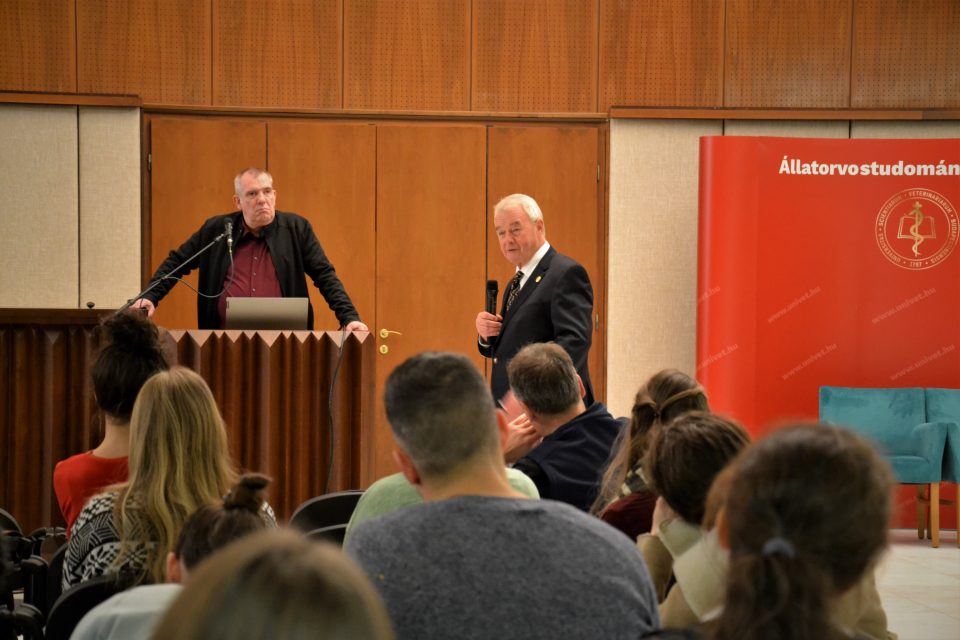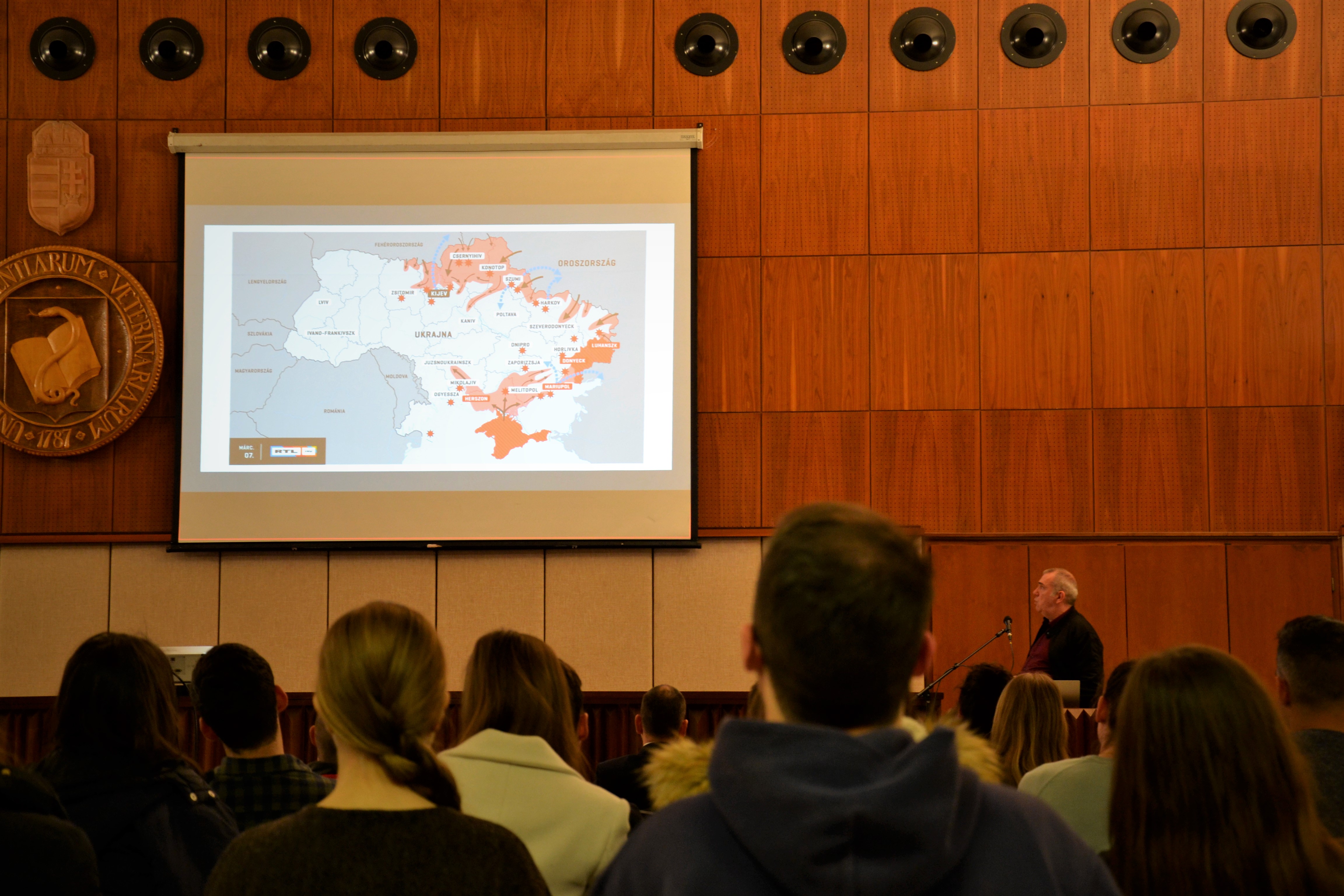On March 10, Dr. Péter Tálas, a scientific researcher and the head of the Strategic Defense Research Institute at the University of Public Service, gave a lecture titled “War in Ukraine” at the University of Veterinary Medicine Budapest. He also answered questions from the audience.
Firstly, he summarized what this war is about. In regional terms, Russia aims to prevent Ukraine’s approach to the West; it considers the country as a buffer zone and its sphere of influence, crucial for the Eurasian Economic Union led by Russia. In global terms, Russia seeks to return to sphere-of-interest politics, reintroducing war – military force and the threat thereof – into the toolbox of great power assertion; it aims to become a global power pole in the new world order, questioning the existing status quo.
 The speaker then presented how we got to this point. He mentioned the expansion of NATO and the EU towards the east and Russia. In 2008, the West promised NATO membership to Georgia and Ukraine, supported the democratization of Ukrainian society, and backed the new Ukrainian governments from 2014 onwards. They refrained from letting Russia decide Ukraine’s fate with the great powers (excluding Ukraine), but at the same time, they supported the non-fulfilment of the Minsk agreements.
The speaker then presented how we got to this point. He mentioned the expansion of NATO and the EU towards the east and Russia. In 2008, the West promised NATO membership to Georgia and Ukraine, supported the democratization of Ukrainian society, and backed the new Ukrainian governments from 2014 onwards. They refrained from letting Russia decide Ukraine’s fate with the great powers (excluding Ukraine), but at the same time, they supported the non-fulfilment of the Minsk agreements.
In 2014, the pro-Russian Viktor Yanukovych government was overthrown in Ukraine, eastern Ukrainian separatism was suppressed, and an association agreement was signed with the EU. They rejected the fulfilment of the Minsk agreements and facilitated the building of the Ukrainian nation-state through political means.
Vladimir Putin criticized NATO in his speech at the Munich Security Conference in 2007. In 2008, the Russo-Georgian War took place. Russia annexed the Crimean Peninsula in 2014 and maintained eastern Ukrainian separatism. From 2015 to 2022, they demanded the fulfilment of the Minsk agreements and veto power over the separatist territories vis-à-vis Kyiv.
Since March 2021, Russian troops have been deployed along the Ukrainian-Russian and Ukrainian-Belarusian borders, with the number of soldiers estimated at 190,000 to 200,000. In December 2021, Russia made demands towards NATO and the United States. On February 24, 2022, they attacked Ukraine.
The initial strategic goal of the attack was to occupy Kyiv and overthrow the Volodymyr Zelensky government. It started as a swift war with asymmetric power dynamics between the parties, but it eventually became protracted. The Russian leadership underestimated the resilience of Ukrainians and overestimated the capabilities of its own military force.
Political and military responses have been formulated for the war. The United Nations condemned the aggression, with only six states not doing so. Russia’s membership was suspended in the Council of Europe, and it was expelled from several international organizations. Support for Ukraine’s rapid EU membership emerged, and the policies of European countries towards Russia radically changed. NATO and EU member states do not engage in war for Ukraine, nor do they introduce a no-fly zone, but they support Ukraine with weapons, military equipment, information, and money. NATO reinforces the countries on the eastern flank of the alliance.
The war is met with one of the strongest sanction policies in history by the EU, USA, Canada, Australia, Japan, Switzerland, and the United Kingdom. Cyber operations have been initiated against Russia, and airspace has been closed to Russian state and private aircraft. Several hundred major companies suspended their activities.
Dr. Péter Tálas outlined two potential outcomes of the war: Russia’s actual military and political victory or Russia’s symbolic military victory and a political compromise between the parties.
The strategic consequences of the war for Russia could include political, economic, and social isolation. The West (NATO, EU, and USA allies) will review their policies towards Russia, strengthen NATO’s eastern flank, detach Europe from Russian energy, and deepen integration in the defense sector. Eastern and Central European countries may become destination countries for a new migration wave, which could change their previous attitude towards migration.
Answering questions, Dr. Péter Tálas stated that the war is a tragedy for Ukraine and a disaster for Russia. If sanctions were successful, an aggressor could be deterred without war. In sanctions, Europe always bears the greater burden. The consequence of the war could be a significant change in the Russian-Chinese partnership. However, this relationship could become highly asymmetric since Russia’s economic weight is less than 2% of the world economy, while China’s is estimated at 13-15%. Political nation-building is taking place in Ukraine, and according to the speaker, Vladimir Putin has done the greatest service in strengthening Ukrainian national consciousness. The United States acts according to its own interests. The question is whether Europe, which needs unity, will be capable of it.
Gusztáv Balázs

